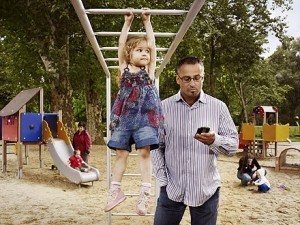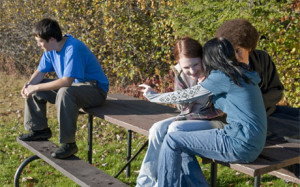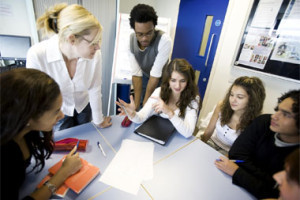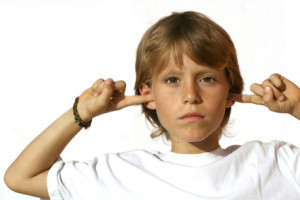Rosalind Wiseman's Blog, page 30
March 4, 2015
GDC 15 // Slide Deck
March 3, 2015
ADL: Rosalind’s Classroom Conversations // Online Behavior — We’re Just As Bad As We Say Teens Are
 We have a responsibility to our students to acknowledge a glaring double standard that’s happening way more than we want to admit: Adults abuse technology and get away with it.
We have a responsibility to our students to acknowledge a glaring double standard that’s happening way more than we want to admit: Adults abuse technology and get away with it.
Think about it. We regularly lecture our students and children about how they should behave online, make them sign technology contracts that give us the right to discipline them including restriction of privileges, school suspension and expulsion– while many parents and educators ridicule, humiliate and bully people online without repercussions. Even worse, parents and teachers aren’t just going after other adults. They sometimes target young people and when these adults are exposed, they typically dismiss what they did or go on the attack again.
Before we lecture young people any more about how “They should think carefully before they push send,” let’s take an honest look at our own online behavior.
Here are just a few of the examples I’ve seen or read about recently:
Driven by spiteful revenge
A parent finds out about an offensive comment or picture another child posted online. Instead of calmly using the situation to talk to their child about it as an example of what not to do, or inform the parents of the offending child by saying some version of, “This was really uncomfortable call to make but I thought you’d want to know…” instead the parent takes a screen shot of the post and then anonymously sends it to the other parents or posts it publicly. Humiliating a child, even one who has bullied another child, is about revenge and just plain wrong.
Our job as adults is to address the problem in a way that has the best chance for the aggressor to learn that the values of the community are to uphold people’s dignity. In any case, when a child is the target, the parent should focus their attention on the physical and emotional well being of their child, not exacting revenge on the aggressor. Teachers and schools should also reinforce this message.
Creating a hostile school environment
This is small thing but it happens a lot. A teacher grabs a phone out of a student’s hand and then that same teacher is checking her Facebook page a few minutes later. Just that little moment sends the message that a teacher can enforce a rule that they don’t have to follow themselves.
But that’s nothing compared to teachers using their phones to directly bully a student. A teacher recently took a picture of a ninth grade boy in her school and posted it on Instagram with the following caption, “STEM (Science, Technology, Engineering and Mathematics) kids are trying too hard. I don’t know him but I hate him.” When the student responded, “You can’t hate me. You don’t know me.” The TEACHER responded, “I know I don’t know you but I can hate anyone I like.”
It’s easy to look at what that teacher wrote and vilify her—and believe she is unusual. I’ve spent my professional life in schools and I know how dedicated many teachers and administrators are; however, it’s disingenuous to not admit the very real fact that there are educators who go out of their way to humiliate children. In this case, social networking is helpful because there’s proof about what this teacher did. The student was able to take a screen shot of the post. Otherwise, in my experience, way too often the child won’t speak to an administrator, because they would believe that the administrator will automatically take the teacher’s word over the child’s. The teacher could deny it, say that the child just took it the wrong way, or say the student is overly sensitive—the classic ways in which people who bully abuse their power to silence their targets.
Spoiling for a Fight
It’s usually on Twitter and it’s usually about sports or other school events. Parents are posting rude tweets gloating about their children’s victories–baiting the teens on the losing team to respond. And it’s just as bad when the parents are on the losing side. Students I work with report Dads and Moms tweeting at them about how they cheated or were poor sports (which is highly ironic). The responses I’ve seen from the kids? “Umm…you’re parents…” And when the kids do respond in an obnoxious way, the parents become self-righteous, indignant and lash out at the kids again. As one of the high school seniors I work with commented,
“They’re parents trying to start beef with high schoolers, it looks ridiculous to us. However if we respond at all it proves their point.”
I’m not justifying young people’s rude responses, but it’s the height of adult hypocrisy to start a fight online with teens and then not take any responsibility for it.
What we can do
We need to do the following right away:
We need to apologize on behalf of all adults for demanding young people follow rules that a lot of adults won’t follow themselves.
We need to apologize on behalf of all adults for punishing young people for disobeying rules while adults who break those same rules get away with it.
If we’re going to demand that students sign technology contracts we need to demand parents and anyone who works in the school to sign it as well. And if you break the rules, it doesn’t matter who you are, you will be held accountable.
If you’re an educator and a child tells you about an adult who is going after them or their friends—get involved. Thank them for telling you, ask her or him what their ideal outcome is and then handle it like a mature adult. Which means, tell the administrator you trust the most, check your protocols and then someone should respectfully but firmly tell the aggressor to back off and that their actions are against school policy and overall values.
It is our responsibility to send a clear and direct message that those in power will follow the same rules as they enforce on others.
Originally posted on ADL’s Classroom Conversations
February 10, 2015
Family Circle: When It “Takes a Village,” Here’s How to Create Yours
 It’s one of the most common parenting slogans we hear, affirmed by everyone from politicians to pediatricians: “It takes a village.” On the face of it, that’s true. But when you really think about it, there are a lot of assumptions going on here. Like, that everyone in the village agrees about the way to raise children. Or that everyone in the village is a mature adult who knows how and when to get involved in children’s lives.
It’s one of the most common parenting slogans we hear, affirmed by everyone from politicians to pediatricians: “It takes a village.” On the face of it, that’s true. But when you really think about it, there are a lot of assumptions going on here. Like, that everyone in the village agrees about the way to raise children. Or that everyone in the village is a mature adult who knows how and when to get involved in children’s lives.
I don’t know about your village, but in mine there are all sorts of people. Some of them I definitely want helping me out with my kids. Some of them…not so much. Plus, I’ve seen countless times when we actually have a problem involving our kids that also happens to involve other people (teachers, coaches, other parents, other kids) in our village.
At the end of the day, you have to ask yourself: Do you trust your village or not? Why do so many of us assume the worst of our village’s intentions? And how do you define your village? The first two questions you’ll have to answer yourself. But the last I can help with. Here are the top three ways to create your village.
1. Identify the most important characteristics of your “villagers.” Mine are:
* treats kids with dignity,
* is comfortable calling children out when they do something boneheaded,
* is warmhearted (they can still be tough on the outside) and not a pushover
* laughs when kids make “foolish” mistakes
* and—most important—knows my children and still likes them.
2. With these characteristics in mind, try to identify two people who have most of these attributes in each of your smaller villages: at your child’s school, in your neighborhood, among your friends, your family and adults in your children’s extracurricular activities (that includes coaches, of course).
3. Make a list for yourself. You don’t have to go up to each of these people and tell them they’ve officially made your list, but write it down so you don’t forget it when you need it most.
The next step in the process is considering how you’ll use them when the moment comes. Read this letter from a mother who recently emailed me and see how her village worked.
Just as my 15-year-old son was supposed to get out of the car to go to school (already 5 minutes late), he mentioned he was being bullied there. He went on to school. I watched him walk in so he couldn’t ditch. Then I called his counselor at school, who checked on him today. When I picked him up I asked if he wanted to talk and he said, “Not now.” In the past I would have pushed him to talk right away, but I gave him space and he came to me later in the afternoon and we talked.
This is a difficult moment for any parent. Her 15-year-old son (a group not known for talking about their problems) drops a bomb as he’s getting out of the car. He did that on purpose. He wanted to tell her, but he didn’t want to talk to her about it.
She could have run after him. She could have run into the school assuming that the school would do nothing about it unless she broke into the principal’s office. But she didn’t. She thought about what would work for her son. She didn’t let her emotions get the best of her. She reached out to her (and, most important, her son’s) village by contacting his counselor and asking him to check in on her son. She trusted that the process would work. Then she gave her son a little bit of space, and her son reacted by telling her what happened—when he was ready.
Originally posted on Family Circle Momster
January 14, 2015
ADL: Rosalind’s Classroom Conversations // The Power of Gossip

BigStock
I hate how people keep getting into my business and judging me before they talk to me and find out the real story. “Michael”, age 16
It doesn’t matter what people say. Sure, someone’s reputation gets trashed for a few weeks but then the gossip moves on to someone else. “Ana”, age14
These two quotes reflect what most young people I work with believe. The first statement was from a well-respected high school student in a leadership development training I recently conducted. The second was from a seventh grader who was defending her right to spread rumors online about a classmate she didn’t like.
What harm really comes from gossip? Does it affect the individual student or the community as a whole and if so, how? If it’s as common as many young people and educators I work with believe, should we do anything to stop it? Is it possible?
From the time I began teaching twenty years ago to last week’s consultation with a school, I’ve found that gossip does impact us in profound ways—from an individual’s ability to develop personal authenticity and integrity to the entire school culture.
Gossip is the invisible force that controls people’s behavior and reinforces the dynamics that allow us to dehumanize each other. It creates a culture where people are afraid to speak against what they perceive to be the opinion held by those with high social status and power. During a presentation, I recently asked a high school senior why people won’t speak their minds to each other in her school. She replied, “Because we are afraid.” “Afraid of what?” I asked. She couldn’t say anything more.
Why do we gossip? Gossip bonds people together by creating an “us” vs. “them” dynamic. Whatever the gossip is about, there is an unspoken agreement between the people sharing the information that the subject of the gossip somehow deserves the scorn and ridicule.
But gossip isn’t equal opportunity. It sticks to people who are already socially vulnerable because of their race, socio-economic status, ethnicity, sexual orientation and/or gender expression. It “sticks” because our stereotypes about those identities reinforce the believability of the gossip. We see the target of the gossip less as a person in a particular circumstance and more as a reflection of the bias we already have.
One of the most persistent examples is who is labeled as a “slut.” I typically find this label directed at girls with low social status (usually tied to having relatively less financial resources than their peers), regardless of their actual sexual experience. On the other hand, a girl with higher social status can be much more sexually active and never get that label. People may gossip about what she did at the party last weekend but the “slut” label isn’t attached to her. Her social status is her armor. It’s incumbent upon all of us as adults to think about what we think we “know” about the individual people within our communities. It is our obligation to challenge ourselves if stereotyping and bias are empowering gossip to label and dehumanize any individual.
Here are some things educators should keep in mind:
Be clear with your students about the difference between venting and gossiping.
Venting is when you process a difficult interaction you had with a third party. Gossiping is when you share information with the purpose of humiliating or isolating another person.
Challenge the mindset of, “Gossip happens all the time and it doesn’t matter because it’ll move on to someone else.”
It’s the classic dynamic where cruel behavior becomes so normalized that you don’t think there’s anything one should or can do to stop it. It’s critical to challenge this line of thinking, not only with your students but also with adults in the school community. We can’t allow children to learn that seemingly small acts of degradation are acceptable as long as it’s not happening to them. We also have to teach that hurtful words matter and it’s completely understandable to be upset and anxious if you are targeted. Those feelings should be acknowledged, not dismissed. Adults shouldn’t say, “You shouldn’t let those kids get to you” because the shame of not being able to “take it” only adds to the student’s feelings of inadequacy and sense of isolation.
Define community as a place where people can truly disagree.
We usually tie the definition of a school community to school spirit. But school spirit is typically characterized as unity. This is a problem because most schools tie school spirit activities to high social status sports and by extension the children who participate in those activities. If a student or group of students don’t want to participate in these activities, they are often labeled as disloyal and difficult. In turn, these students often believe that their opinions and experiences, especially when they’re in conflict with others at the school, will be dismissed.
In addition, very few of us will disagree with or challenge someone with more social power than we have—it doesn’t matter what the issue is. Instead, “community” needs to be defined as a place where people within it feel free to disagree and be confident that they won’t be punished for coming forward. Being part of a community should include people sometimes feeling uncomfortable because others make them think about things in a different way.
Be aware of your own baggage.
Teachers are like everyone else. We grow up with our own biases and it naturally affects how we interact with and think about our students, our colleagues and the parents. To counter this, we can do our own personal self-assessment as well as participate in ADL’s anti-bias training.
Let’s be honest: many teachers talk about their students’ personal lives. Usually it’s about a conflict between friends, a break up, the drama that happened at a dance or who had a big party last weekend. Again, how we react and think about the information we receive about our students and what we say has a lot to do with our own bias and stereotyping that is sometimes unspoken or unconscious.
Our students are only going to stop gossiping if the adults take active steps to stop it. Let’s take the dance example. There’s a big difference between talking about who may have gotten the nerve up to dance with their latest crush and belittling a female student for dressing “trashy.” We need to own it and stop if we are doing it ourselves. If we hear a colleague talk about the students with a tone and intent of gossip, we need to say, “Hey can we talk about this for a minute? Is there something about the student you’re worried about?” Then try to coach them to focus on the right thing: the student’s welfare. “Wow, that’s really troubling. What do you do think is going on with her? How do you think we can support this kid?”
If we hear students gossip about another student we need to say, “I am hearing students that I really respect gossip about another student. I’m hoping that is beneath the standards you have set for yourself. And I have to tell you, it’s bothering me that someone else’s embarrassment is being used for your entertainment.” If they roll their eyes or give you the impression that they aren’t taking you seriously, I’d add this, “If I heard people talking about you like this, I’d challenge them the same way I am challenging you right now. It’s a big deal to me that my students don’t bring themselves down by trashing other people. But if you disagree or see it another way, I want to know what you think, so let’s set up a time to do that.”
I know it can seem like there’s no way to stop gossiping within a school. But sometimes I think we don’t allow ourselves to acknowledge what the stakes are. And yes, this is often an uphill battle and our colleagues may say we should focus on more important things. But if we believe that gossip is one of the building blocks that dehumanizes students and stops people from speaking courageously, what is more important to fight for?
Originally posted on ADL’s Classroom Conversation
December 3, 2014
Family Circle: When Friends Turn to Foes
 Two’s company and three can be a crowd when it comes to tween girls and friendships. So how can a mom help her daughter smooth things over when an expanding circle of friendship starts to wreak havoc? Our parenting expert Rosalind Wiseman received an email from a worried mother dealing with just such a dilemma. Here’s Rosalind’s advice for keeping the peace.
Two’s company and three can be a crowd when it comes to tween girls and friendships. So how can a mom help her daughter smooth things over when an expanding circle of friendship starts to wreak havoc? Our parenting expert Rosalind Wiseman received an email from a worried mother dealing with just such a dilemma. Here’s Rosalind’s advice for keeping the peace.
Dear Rosalind,
My 8-year-old daughter (I’ll call her Alexa) has known another 8-year-old girl (let’s call her Becky) since they were 4 and they’ve gone to the same school. Last year a new girl (let’s call her Jamie) came in halfway through the year and my daughter befriended her. Jamie has a difficult home situation and lives with her great-grandmother. Sadly, Becky is one of several people—including Becky’s overprotective mom—who don’t like Jamie and are giving my daughter a very hard time over the friendship. They’ve begun excluding Alexa. Becky used to cling to Alexa like glue and Alexa never pushed her away. I can’t understand why this girl has become so unkind to my daughter.
As hard as this is to believe, I’d bet any amount of money that the overprotective mom thinks she’s in the right—that in her mind she has a perfectively justified reason for supporting her daughter (Becky) in excluding your daughter’s (Alexa’s) new friend. So let go of “understanding” this woman’s perspective or why her daughter can’t accept the new friendship and focus on supporting your daughter and her new friend.
The only time I would talk to the nasty mom is if she confronts you or something happens between the girls that necessitates you speak with her. If that does happen, I’d say to her, “My daughter likes this new girl and we support the friendship. Our daughters don’t have to be friends, but I would like your support in allowing the girls to go their separate ways without being hurtful to each other.” Then get ready for this woman to be defensive or tell you the reasons why the new girl is a bad influence. Don’t get sucked in. The most you should say in response is, “That’s not been my or my daughter’s experience with this girl and I hope you would respect that.”
You also need to talk to your daughter. Tell her that you’re disappointed that her old friend isn’t being nice to her or the new girl. Maybe she’ll turn around one day but for right now, ask your daughter to give her some space until she can be a good friend.
If the old friend continues to be mean to her or the new girl, she needs to tell you and/or the person she thinks is the smartest adult at school what’s happening. But at base, this is an opportunity for your daughter to learn an important lesson from you: Sometimes good friends do things that make it impossible to continue the friendship for right now. Maybe later things will change. But in the present, it’s important to have friendships with people you actually like who allow you to be friends with others as well.
Originally posted on Family Circle Momster
November 30, 2014
ADL: Rosalind’s Classroom Conversations // Making it Meaningful: Interrupting Biased Comments in the Classroom

iStock
What do you do if you if think you hear one of your students make a racist, homophobic or sexist remark? Or more difficult, what if you hear it or think you hear it, but you’re not absolutely sure who said it?
This is one of those common yet incredibly difficult moments in a classroom that matter: Handle it wrong and your authority in the class is compromised; handle it right and you role model how an adult can right a wrong in a profoundly meaningful way for children.
First let’s look at how well meaning teachers can contribute to the problem. “That’s enough!” is a standard response from a teacher to a group of students when they’re being loud and need to settle down. But it’s also a go-to response when a student is bullying another child with a racist, sexist or homophobic comment. Take a step back and listen to the message communicated in that moment from the teacher—it’s a tacit approval or acceptance of what’s happening. Said another way, there should never be an amount of cruelty or bigotry that’s acceptable.
Instead, at the minimum, as soon as a teacher hears a derogatory comment, they should say, “Using that word(s) to put someone down is unacceptable.” At that point, they can go back to teaching their class or they can make the decision to spend a few more minutes addressing the remark with some depth.
When students push back, which happens all the time, there are two usual reactions:
“They don’t care! I was just joking.” Again, well meaning teachers often turn to the target and ask them if this is true. In that moment you have lost the teaching opportunity. The target will tell you they don’t care because they have to agree with their more powerful peer. Instead, teachers need to say strongly, “Saying X to put someone down is unacceptable. I don’t want it in my classroom and I’m not going to get into a discussion with you about if you were joking or not because it’s easy to say ‘just joking’ as an excuse to get away with this kind of comment.” If you have time, use the opportunity to discuss how to challenge biased language.
“I didn’t say it!” is a classic response and very tricky to handle well. Here’s why. It can be hard to be sure that you identified the student correctly. Out of a basic sense of fairness, you don’t want to wrongfully accuse anyone and if you get it wrong it’s likely that the students know who really did it but won’t tell you. Some teachers respond by saying something like, “If the person who said it doesn’t come forward, the whole class will be punished.” What usually happens is that no one speaks. Loyalty of silence reigns and the teacher is left fuming. Not only did a student get away with being cruel to another student but the teacher demonstrates that they are unable to handle the situation effectively. It reinforces the power dynamics between the students.
All while the actual issue gets lost. Communication shuts down. And really, finding out the “culprit” is not really the point. The point is that the comment was made and it’s important to help students understand why it’s wrong, no matter who said it.
Here are some suggestions for doing it differently.
Acknowledge that the point isn’t who said it but that it was said. Reaffirm with the quick values statement, mentioned above, about not using those words to put someone down. If any student argues with you, let them finish and then say, “You and I have a disagreement about this. I can’t allow you or any of my students to put people down. If you want to speak to me about this further, you can schedule an appointment to talk with me, but right now those comments need to stop. Are we clear?”
To address the comment in a meaningful way and to make it a teachable moment, spend a few minutes (or more, if possible) talking about these kinds of comments, why they are wrong and how we can address them in the classroom or school.
If you have only a few minutes, describe the different types of teasing. Explain that there is “bonding” teasing where you feel liked and connected to the person teasing you. “Annoying” teasing is when the person is insensitive to your reactions. And then there is malicious teasing when the teaser repeatedly goes after you specifically around perceived insecurities to humiliate you in public. As the teacher, it is critical to remind the students that everyone can be on the giving or receiving end of all of these kinds of teasing and malicious teasing can lead to or be considered bullying.
If you have a longer period of time to have this conversation, start off by describing the different types of teasing. Then, expand the conversation to include why it’s so difficult for the targets to speak out, why targets often laugh it off and how that destroys the target’s credibility later if they ever want to come forward to admit how upset they are. This discussion can easily connect to any history or social studies curriculum that teaches about the nature of bystanding and the importance of protecting people’s rights to come forward to voice a politically or socially unpopular opinion. You can also elicit from students why they think these comments are so pervasive and what they think should be done about it.
Unfortunately, racist, sexist and homophobic comments are prevalent in middle and high schools across the United States. However, teachers have a powerful opportunity to turn those remarks into opportunities for sharing, learning and change.
Originally posted on ADL’s Classroom Conversations
November 11, 2014
Family Circle: Putting an End to Negative Self-Talk in Kids
 A little negativity can go a long way. So when you’ve got a kid who is constantly down on himself, getting him to listen to a positive perspective can seem like an impossible task. A few days ago, the following email from a parent with just this problem landed in the inbox of our parenting expert, Rosalind Wiseman. Here’s her advice for silencing negative self-talk.
A little negativity can go a long way. So when you’ve got a kid who is constantly down on himself, getting him to listen to a positive perspective can seem like an impossible task. A few days ago, the following email from a parent with just this problem landed in the inbox of our parenting expert, Rosalind Wiseman. Here’s her advice for silencing negative self-talk.
Q. My 10 year-old son has such a defeatist attitude. He’s always saying, “I’m no good at this or I’m no good at that.” His so-called teammates and friends blame him when they lose games and they never invite him to anything after school. I always struggle to think of the right things to say that my son will actually take to heart. How can I help him?
A. I understand how frustrating this is for so many parents. You feel like there’s nothing you can say to make it better. And if you don’t say, “No honey, you’re great!” you worry that it sounds like you agree with him. So here are my suggestions.
1. Stop using “You’re so great” as your go-to response. It comes across as not listening to your child. Instead, what I find more helpful is to say something like this:
You: I’m really sorry. Will you tell me a little more about why you’re feeling this way? Are there specific things you’re feeling down about?
Your child: I’m so slow. I get teased all the time because I’m the slowest kid in the world. No one has ever been as slow as me in the history of my school.
You: Wow, that’s really hard. I can imagine how annoying that is because it’s not like you want to be slow, and then the kids who tease you make it even worse. There are a couple of things I want you to just consider, not necessarily agree with, but just consider. No one can be good at everything. But the same is true the other way. No one is bad at everything either. I want to make a list of the things you’re good at and the things you’re not so good at. Then you can choose if you want to work on something on your list you want to get better at. Like if you want to get better at running, you can work on that.
 2. Consider who’s inspiring these comments. Since classmates or other kids on the team are feeding negative comments to your kid, you might add something like this:
2. Consider who’s inspiring these comments. Since classmates or other kids on the team are feeding negative comments to your kid, you might add something like this:
“I know it’s a lot to think about but I want to talk about what’s happening with your friends too. If other kids are mean to you, there are two ways I think you can handle it. Maybe you can think of more. You can laugh it off. Like, if kids on the basketball or track team are teasing you because you’re not as fast as them, you could say: ‘Yes, I’m really slow.’ Sometimes admitting it takes away some of the teasers’ power. Or you could choose not to run in any races or play in any games until you feel more confident. What do you think is a good way to handle it?”
Then listen to your child as he thinks through what he wants to do to have a little control and dignity in this situation.
3. Think about the benefits of being left out here. On the issue of those boys not inviting your son to things: take a step back. I know it feels bad when other children don’t include your child. However, in this case, do you want your son to be in a situation where they could easily ridicule him under the guise of joking around and playing? Overall, what he needs to do is work on the things he identifies for himself that he wants to get better at and then choose genuine friends who make him feel good instead of tearing him down. Even having one friend who treats him well is way better than hanging out with a group of kids who make him feel bad.
Originally posted on Family Circle Momster
Family Circle: Putting an End to Negative Self-Talk in Kids

A little negativity can go a long way. So when you’ve got a kid who is constantly down on himself, getting him to listen to a positive perspective can seem like an impossible task. A few days ago, the following email from a parent with just this problem landed in the inbox of our parenting expert, Rosalind Wiseman. Here’s her advice for silencing negative self-talk.
My 10 year-old son has such a defeatist attitude. He’s always saying, “I’m no good at this or I’m no good at that.” His so-called teammates and friends blame him when they lose games and they never invite him to anything after school. I always struggle to think of the right things to say that my son will actually take to heart. How can I help him?
I understand how frustrating this is for so many parents. You feel like there’s nothing you can say to make it better. And if you don’t say, “No honey, you’re great!” you worry that it sounds like you agree with him. So here are my suggestions.
Stop using “You’re so great” as your go-to response. It comes across as not listening to your child. Instead, what I find more helpful is to say something like this:
You: I’m really sorry. Will you tell me a little more about why you’re feeling this way? Are there specific things you’re feeling down about?
Your child: I’m so slow. I get teased all the time because I’m the slowest kid in the world. No one has ever been as slow as me in the history of my school.
You: Wow, that’s really hard. I can imagine how annoying that is because it’s not like you want to be slow, and then the kids who tease you make it even worse. There are a couple of things I want you to just consider, not necessarily agree with, but just consider. No one can be good at everything. But the same is true the other way. No one is bad at everything either. I want to make a list of the things you’re good at and the things you’re not so good at. Then you can choose if you want to work on something on your list you want to get better at. Like if you want to get better at running, you can work on that.
Consider who’s inspiring these comments. Since classmates or other kids on the team are feeding negative comments to your kid, you might add something like this:
“I know it’s a lot to think about but I want to talk about what’s happening with your friends too. If other kids are mean to you, there are two ways I think you can handle it. Maybe you can think of more. You can laugh it off. Like, if kids on the basketball or track team are teasing you because you’re not as fast as them, you could say: ‘Yes, I’m really slow.’ Sometimes admitting it takes away some of the teasers’ power. Or you could choose not to run in any races or play in any games until you feel more confident. What do you think is a good way to handle it?”
Then listen to your child as he thinks through what he wants to do to have a little control and dignity in this situation.
Think about the benefits of being left out here. On the issue of those boys not inviting your son to things: take a step back. I know it feels bad when other children don’t include your child. However, in this case, do you want your son to be in a situation where they could easily ridicule him under the guise of joking around and playing? Overall, what he needs to do is work on the things he identifies for himself that he wants to get better at and then choose genuine friends who make him feel good instead of tearing him down. Even having one friend who treats him well is way better than hanging out with a group of kids who make him feel bad.
Originally posted on Family Circle Momster
November 3, 2014
Family Circle: When Dads Need Help Understanding Tween Girls
 Carpools are supposed to make everyone’s lives easier, but this one ride may have caused more trouble than it was worth. Check out our parenting expert Rosalind Wiseman’s correspondence with a mom who was upset by a dad who made her daughter feel like an outsider.
Carpools are supposed to make everyone’s lives easier, but this one ride may have caused more trouble than it was worth. Check out our parenting expert Rosalind Wiseman’s correspondence with a mom who was upset by a dad who made her daughter feel like an outsider.
Dear Rosalind,
The father on carpool duty picked up my daughter and his from dance class and then took them to a party my daughter wasn’t invited to. When he dropped his daughter off, the windows opened, everyone saw my girl and she was humiliated. She is rightfully questioning whether this girl is a thoughtful friend, while I’m left wondering how to talk to the parents about this so the same situation doesn’t happen again. It’s hard enough to navigate new friendships and the party circuit without parents undermining your kid.
Signed,
Disappointed by Carpool Dad
Hi, Disappointed,
I am not excusing his behavior, but I always try to understand why a parent would do something that’s insensitive to a child. Once I understand it, it’s easier to figure out how to talk to the parent so it doesn’t happen again.
In this case, I am guessing that the dad didn’t have a clue what was going on until it was unfolding. Even if he did, he probably did what a lot of us do in awkward social situations: pretend it’s not happening. Think about it from his perspective. He’s picking up carpool and when he realizes that your daughter isn’t invited, he’s between a rock and a hard place. If he had called you from the car, that would have been worse for your daughter. If he hadn’t put her in his car, he would have had to leave her at practice. So my question to you is: What would you have liked him to do?
And regarding your daughter’s friends who attended the party, unless they’ve been excluding her in other ways, they could have felt awkward about the whole thing too. I totally understand that your daughter felt terrible and left out. However, I think this is one of those times (unless there is a pattern where the girls are being mean to her) when you acknowledge how crappy the situation is but she’s strong enough to feel those bad feelings, admit them and then move on.
Look forward to hearing back from you and I hope at least some of my advice is helpful.
Best,
Rosalind
Dear Rosalind:
Ideally, I would have liked the father to bring my daughter home before dropping off his daughter at the party. We have seven elementary schools that feed into three middle schools, so there are new faces right now, and new friendships forming/shifting. My daughter was upset not to be invited, but not devastated. She didn’t think much of her friend going on and on about the party in the carpool ride. She interpreted that as rudeness and thought her friend should know better. She was most embarrassed by being seen in the car by friends she did know who were already at the party. She hasn’t let it bother her since and has moved on—a good sign.
Anyway, I resolved this with the parents, by text, and I’ll paraphrase.
Me: With that party, last week was rough on my daughter, so just wanted to let you know that it’s not a problem to shoot me a text or call, even last minute, if it’s not convenient to bring her home, or if plans change, it’s easy for me to come down to the dance studio. I know how quickly plans change with tweens on a Friday evening!
Other mom: I’m so sorry about that. I was away when the last minute request came for my daughter to go to the party and I was trying to communicate everything to my husband but was busy and didn’t think about all the implications.
Me: I absolutely know there was no ill intention, just wanted us all on the same page for the carpool to work for all the girls.
Now, here’s my bottom line after the back-and-forth with this mom: What I love about this parent is that she’s role modeling appropriate involvement in her tween daughter’s life. She recognizes her daughter was upset but not devastated. She reaches out to the other parent to share her concern but is clear about wanting to move forward for all the girls. The only thing I would like even more is if the dad was involved as well. We need to bring dads into these situations more often, especially when they are directly involved, as this dad was. I get that this can be hard, but I’d like to encourage dads to be involved in the social dynamics that can come up.
Originally posted on Family Circle Momster
Family Circle: When Dads Need Help Understanding Tween Girls
Carpools are supposed to make everyone’s lives easier, but this one ride may have caused more trouble than it was worth. Check out our parenting expert Rosalind Wiseman’s correspondence with a mom who was upset by a dad who made her daughter feel like an outsider.
Dear Rosalind,
The father on carpool duty picked up my daughter and his from dance class and then took them to a party my daughter wasn’t invited to. When he dropped his daughter off, the windows opened, everyone saw my girl and she was humiliated. She is rightfully questioning whether this girl is a thoughtful friend, while I’m left wondering how to talk to the parents about this so the same situation doesn’t happen again. It’s hard enough to navigate new friendships and the party circuit without parents undermining your kid.
Signed,
Disappointed by Carpool Dad
Hi, Disappointed,
I am not excusing his behavior, but I always try to understand why a parent would do something that’s insensitive to a child. Once I understand it, it’s easier to figure out how to talk to the parent so it doesn’t happen again.
In this case, I am guessing that the dad didn’t have a clue what was going on until it was unfolding. Even if he did, he probably did what a lot of us do in awkward social situations: pretend it’s not happening. Think about it from his perspective. He’s picking up carpool and when he realizes that your daughter isn’t invited, he’s between a rock and a hard place. If he had called you from the car, that would have been worse for your daughter. If he hadn’t put her in his car, he would have had to leave her at practice. So my question to you is: What would you have liked him to do?
And regarding your daughter’s friends who attended the party, unless they’ve been excluding her in other ways, they could have felt awkward about the whole thing too. I totally understand that your daughter felt terrible and left out. However, I think this is one of those times (unless there is a pattern where the girls are being mean to her) when you acknowledge how crappy the situation is but she’s strong enough to feel those bad feelings, admit them and then move on.
Look forward to hearing back from you and I hope at least some of my advice is helpful.
Best,
Rosalind
Dear Rosalind:
Ideally, I would have liked the father to bring my daughter home before dropping off his daughter at the party. We have seven elementary schools that feed into three middle schools, so there are new faces right now, and new friendships forming/shifting. My daughter was upset not to be invited, but not devastated. She didn’t think much of her friend going on and on about the party in the carpool ride. She interpreted that as rudeness and thought her friend should know better. She was most embarrassed by being seen in the car by friends she did know who were already at the party. She hasn’t let it bother her since and has moved on—a good sign.
Anyway, I resolved this with the parents, by text, and I’ll paraphrase.
Me: With that party, last week was rough on my daughter, so just wanted to let you know that it’s not a problem to shoot me a text or call, even last minute, if it’s not convenient to bring her home, or if plans change, it’s easy for me to come down to the dance studio. I know how quickly plans change with tweens on a Friday evening!
Other mom: I’m so sorry about that. I was away when the last minute request came for my daughter to go to the party and I was trying to communicate everything to my husband but was busy and didn’t think about all the implications.
Me: I absolutely know there was no ill intention, just wanted us all on the same page for the carpool to work for all the girls.
Now, here’s my bottom line after the back-and-forth with this mom: What I love about this parent is that she’s role modeling appropriate involvement in her tween daughter’s life. She recognizes her daughter was upset but not devastated. She reaches out to the other parent to share her concern but is clear about wanting to move forward for all the girls. The only thing I would like even more is if the dad was involved as well. We need to bring dads into these situations more often, especially when they are directly involved, as this dad was. I get that this can be hard, but I’d like to encourage dads to be involved in the social dynamics that can come up.
Originally posted on Family Circle Momster




